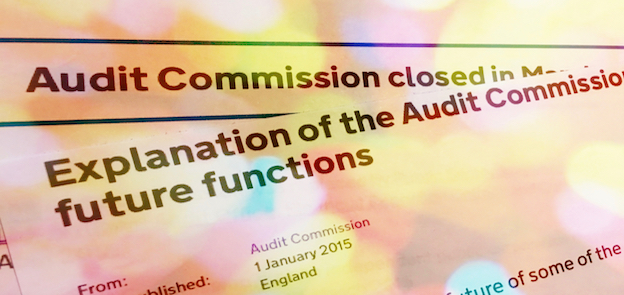Richard Harbord, the former chief executive of the London boroughs of Richmond and Hammersmith & Fulham, explores the idea of resurrecting the Audit Commission to help solve the current crisis within external audit.
Sir Bob Kerslake, former head of the Civil Service, ex-president of the Local Government Association and a former local authority chief executive, recently called for a new Audit Commission.
This follows discussion on the formation of the new Office for Local Government (Oflog) and the current difficult situation in local authority external audit.
The Audit Commission was originally set up by British politician and businessman Sir Michael Heseltine (now Lord) in 1983. At the time, there was considerable concern about the quality of public services and particularly those in local government. The commission’s job, as described in its official history published in 2008, was to “follow the money”, and to assess the “economy, efficiency and effectiveness” with which taxpayers’ money was being spent.
It did a very good job at this and often criticised central government. Particular examples of this centred around care in the community and the complexity of local government finance.
However, its closure came literally overnight. Eric Pickles, former secretary of state for communities and local government, announced the abolition of the Audit Commission in 2010. Although it had 2,000 staff and a turnover of £200m, there was very little opposition to the decision.
There was a general feeling it had grown too big and lost its way. A member of the commission was quoted as saying that “the Audit Commission was good at spotting the mouse in the room but consistently missed the elephants”.
Consequently, the Audit Commission closed on 31 March 2015.
Spotting the next failure
It is important to note that Sir Bob Kerslake is not saying that the original Audit Commission should be replicated.
The current concern is to spot the next failure before it materialises. A lot of the Audit Commission’s work was good at this. The majority of audits were carried out with their own staff and standards, and sharing of information was easier.
Auditors spent considerable time in the authority they were responsible for and were better placed to know what was going on.
In addition, the Comprehensive Performance Assessment was a very good tool for maintaining probity and standards. I was chief executive of one of the minority of London boroughs judged ‘excellent’ from the assessment, but also worked later as a director of finance at a district council judged to be ‘poor’ (the bottom category). Being judged poor was career changing. In this case, the new chief executive adopted the motivational slogan “Aspire to be Weak”, which proved to be successful.
Concern over external audit
The debate currently is about the new proposed watchdog, the Office for Local Government, and separately the fact that there is widespread concern over the state of local authority external audit.
This is mainly because nearly all local authorities are well behind the norms in signing off their accounts. In many cases, 2020/21 accounts are still not signed off and that means that each year the audit has fallen further behind.
To make matters worse, there is now additional concern as a number of authorities are due to change auditors in 2024/25, which will be difficult to manage if the previous years’ accounts are still open.
However, I think it is not credible to think that there is any one solution that will solve both the government’s concerns about spotting potential problems early and everybody’s concerns about the timeliness and professionalism of external audit.
Oflog similarities
The proposal for the Office for Local Government is an attempt to have a watchdog capable of ensuring good practice in councils. A proposal which is not dissimilar, but not so all-enveloping, as the Comprehensive Performance Assessment used by the Audit Commission.
There is however a considerable divergence of opinion about the need and the form of the watchdog.
There have been a number of design workshops that readers will have been involved in which have been run by the Department for Levelling Up, Housing and Communities (DLUHC). These have resulted in several draft metrics for Oflog, which include measures around adult social care, local authority reserves, adult skills, and waste.
15th Annual LATIF & FDs’ Summit – 19 September 2023
250+ Delegates from Local Government & Investment
The workshops have emphasised “a very strong desire to spot the next failing authority before they fail”.
DLUHC is clear that Oflog is to increase transparency, foster accountability and help drive performance, while noting that there will be no league tables and no recreation of the Audit Commission.
It is too early to judge how successful this is likely to be.
The examples of the metrics suggested seem to me to be not particularly insightful on their own, but put together they may indicate warning signs. It should also be noted that CIPFA is urging local authorities to be positive about the new watchdog.
There is some confidence to be gained from the fact that the chair of Oflog, Lord Morse, was highly regarded and effective as an auditor general of the National Audit Office.
This is then all still unfolding. Lord Kerslake is absolutely right about the need for a new framework for performance in local authorities.
The external audit situation
However, there is also an urgent need to resolve and reform the external audit situation.
A number of suggestions have been put forward to allow audits to catch up, but the suggestions to date may not achieve their ends and maintain high standards in authorities.
A short-term fix of not revaluing assets for a year may not be in the best overall interest, even if it could allow two years of audits to be signed off in one year. Personally, I think that is implausible in the current circumstances.
Richard Harbord is the former chief executive of Richmond and Hammersmith & Fulham councils.
—————
FREE weekly newsletters
Subscribe to Room151 Newsletters
Follow us on LinkedIn
Follow us here
Monthly Online Treasury Briefing
Sign up here with a .gov.uk email address
Room151 Webinars
Visit the Room151 channel














